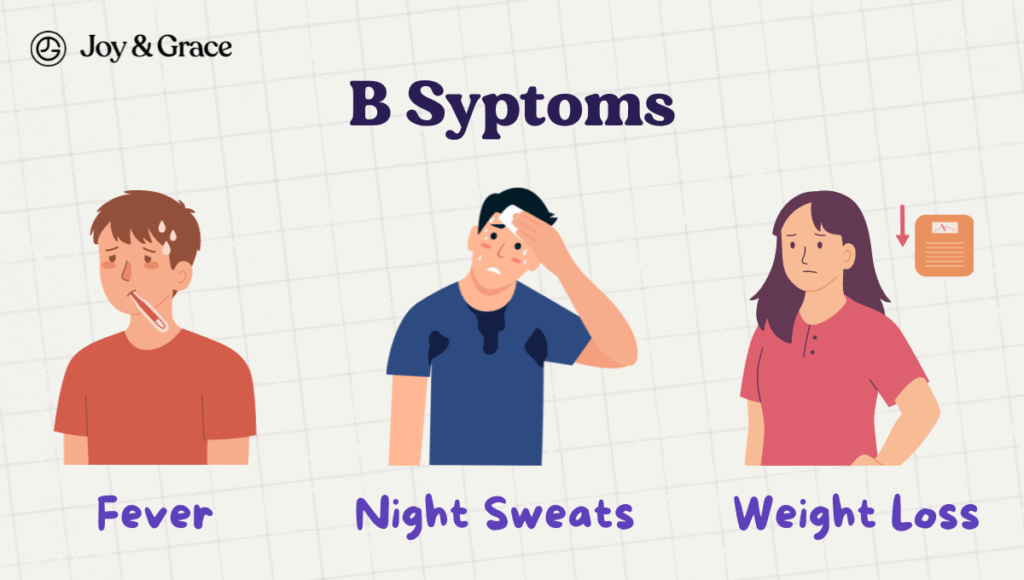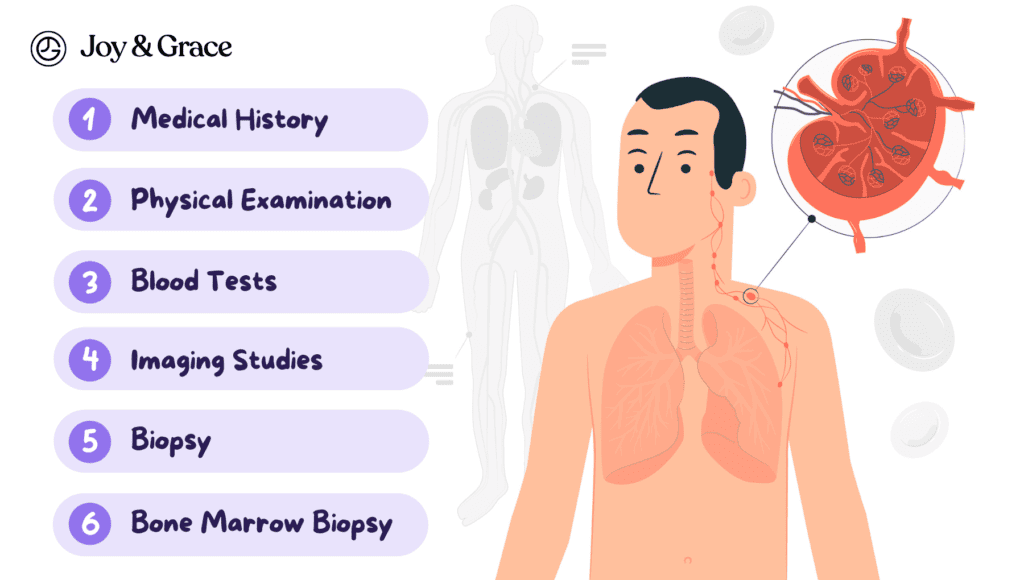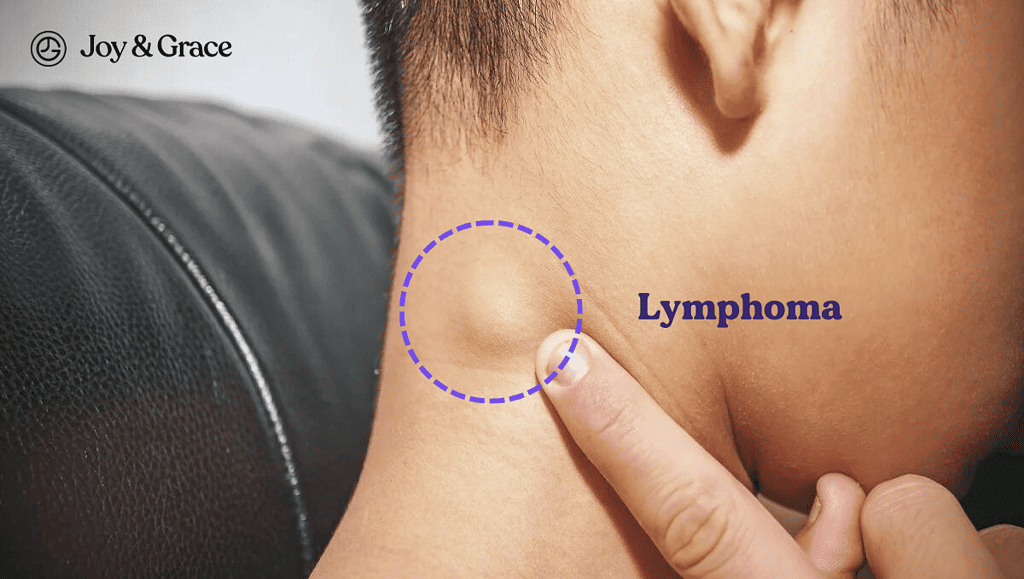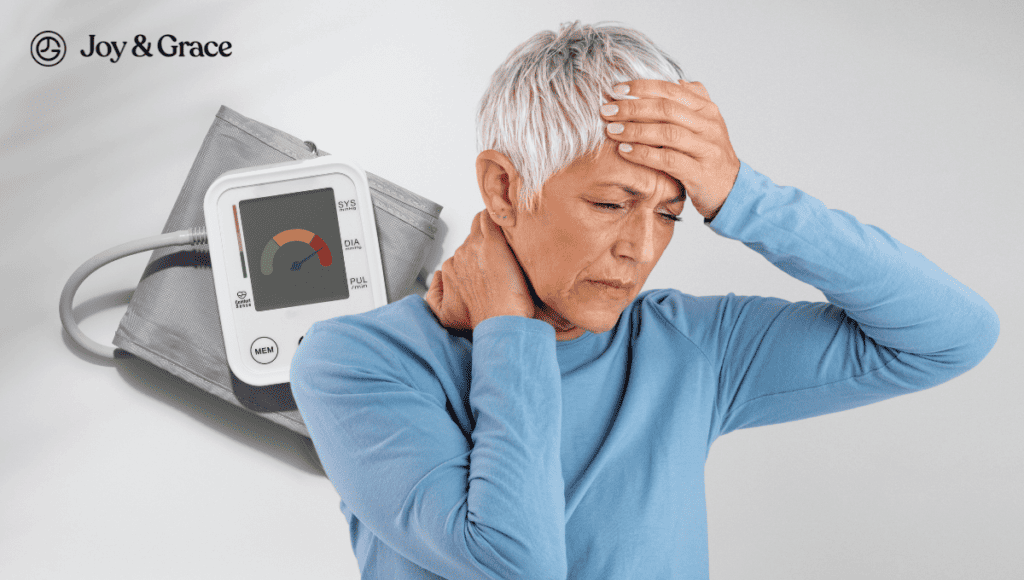Imagine carrying an invisible, heavy backpack you can't take off, causing constant nagging shoulder pain. This kind of discomfort can make even the simplest tasks feel insurmountable.
When dealing with these kinds of pains, our minds often jump to obvious culprits like bad posture or muscle strain. However, could a more serious condition like lymphoma be to blame for the pain?
In this blog, we’ll be exploring the correlation between lymphoma and shoulder discomfort. Understanding these connections could be a crucial step in the journey toward a proactive approach to health.
Can Lymphoma Cause Neck And Shoulder Pain?

Yes, lymphoma can sometimes cause neck and shoulder pain. However, lymphoma isn’t usually the first thing on your doctor’s mind when you complain of neck and shoulder pain. They’re not the main symptoms of lymphoma. Additionally, it’s extremely rare for them to be a presenting sign of the disease.
Lymphoma is a type of cancer originating in the lymphatic system, a part of the body's immune system. It involves the abnormal growth of lymphocytes (a type of white blood cell) and the lymph nodes. Lymphomas make up 5% of all malignancies (cancers).
There are many types of lymphoma. To avoid making things complicated, let’s dial them down to two:
- Hodgkin's Lymphoma (HL)
HL is characterized by the presence of what are called Reed-Sternberg cells, which are large, abnormal lymphocytes. These cells are usually the hallmark of HL and can help distinguish it from other types of lymphoma.
- Non-Hodgkin's Lymphoma (NHL)
NHL comprises a wide variety of lymphomas that do not exhibit Reed-Sternberg cells. Instead, it includes a diverse array of abnormal lymphocytes.
Story (study) time:
- In one case, a 23-year-old male had pain and swelling in his neck and area above the clavicles (collar bones) after a workplace accident. For two months, the swelling progressed, making it hard for him to move his left shoulder. Upon medical examination, the lymph nodes in his neck and armpit showed severe swelling. He was later diagnosed with non-Hodgkin’s lymphoma.
- A 73-year-old man also complained of worsening pain in his neck and shoulder. During the physical examination, the doctors noted pain when pressing on his C3-C7 vertebrae. They also noted his neck's limited movement and persistent muscle contraction of the trapezius. Upon further medical workup, a mass was found in his neck, and he was later diagnosed with non-Hodgkin’s lymphoma.
But remember, having shoulder pain alone rarely means you have lymphoma. It's just one of many possible symptoms and could be caused by different reasons.
The main presenting symptoms of lymphoma are a swollen lymph node, night sweats, unexplained weight loss, and fever. (more on these later.)
Swollen lymph nodes in lymphomas are usually painless. However, lymphoma should be considered if your neck pain is from persistent coughing due to a swollen lymph node in the neck.
Additionally, if you experience sore or painful lymph nodes near your collarbone or neck after drinking alcohol, getting checked for lymphoma is a good idea.
Overall, it's best to see a doctor who can consider all possibilities to get a proper diagnosis.
Does Lymphoma Spread To Shoulder?
Lymphomas can affect any body part where lymphatic tissue is present, including the lymph nodes near the shoulder joint. According to a review, non-Hodgkin’s lymphomas are among the most common shoulder neoplasms.
Rarely, lymphomas can spread directly to the bone and muscle as well.
In one case, a 67-year-old woman was diagnosed with lymphoma of the gastrointestinal tract (in her case, the large intestine). Three months after receiving treatment, she complained of pain and swelling in her right shoulder.
A medical examination showed that her lymphoma had recurred and spread to her right deltoid muscle.
Lymphomas usually spread on advanced stages of disease. Advanced stages show prominent general symptoms before showing up with any shoulder pain.
Is Shoulder Pain Common With Lymphoma?
Shoulder pain is extremely rare in lymphoma. In fact, we can bet that we probably mentioned all the reported cases available on the internet (just kidding!). All jokes aside, though, shoulder pain is so rare in lymphomas that no statistics are available on the frequency of shoulder pain in lymphomas.
Does Lymphoma Cause Shoulder Blade Pain?

Yes, it can. In one case, a 24-year-old male complained of swelling and pain in his left shoulder blade without any other symptoms. Upon medical examination, he was diagnosed with Hodgkin’s lymphoma of the bone that affected his scapula. However, according to the case report, this is extremely rare.
A 53-year-old male also complained of swelling and pain in his right shoulder blade. Upon physical examination, there were swollen glands in his armpit and neck region. He was later diagnosed with non-Hodgkin lymphoma.
Again, shoulder blade pain is highly unlikely to be the initial presentation of lymphoma.
What Are The Risk Factors For Lymphoma?

While the exact cause of lymphoma is often unclear, several risk factors may increase your chances of having it. It's important to note that having one or more risk factors does not necessarily mean you will develop this condition. Individuals without these risk factors can still be diagnosed with the disease.
Some of the common risk factors for lymphoma include:
- Age
Lymphoma can occur at any age. However, the risk increases as people get older. Hodgkin lymphoma, for example, is more common in young adults (15-35 years) and older adults (over 55 years). Meanwhile, non-Hodgkin lymphoma risk generally increases with age.
- Gender
Some types of lymphoma are more common in one gender than the other. For example, Hodgkin lymphoma is slightly more common in males.
- Weakened Immune System
People with weakened immune systems are at an increased risk of developing lymphoma. This can include people with HIV/AIDS or those taking immunosuppressive drugs.
- Infections
Some infections have been linked to an increased risk of lymphoma. This may be due to the increased activity of lymphoid tissue.
- Autoimmune Diseases
Certain autoimmune diseases may increase the risk of certain types of lymphoma. These include diseases like rheumatoid arthritis or systemic lupus erythematosus (SLE).
- Family History
While most cases of lymphoma are not directly inherited, having a family history of lymphoma may slightly increase the risk.
- Chemical Exposure
Exposure to certain chemicals and substances is a potential risk factor for some types of lymphoma. These include herbicides and pesticides.
What Kind Of Shoulder Pain Does Lymphoma Cause?
Because of its rarity, there really isn’t a definite list of characteristics of shoulder pain caused by lymphoma. Shoulder pain can also vary depending on the type of lymphoma and the cancer’s stage.
However, based on the case reports we gathered, shoulder pain from lymphoma was mostly reported to be:
- Moderate to severe in intensity
- A deep ache, sharp stabbing pain, or diffuse pain
- The pain can be located in your shoulder or your shoulder blades
- The pain can radiate to the arm or chest
- The affected shoulder may be tender to touch
- It may be accompanied by weakness or tingling down the arm
- Movement of the affected shoulder may become limited
Again, there’s no exact definition of what shoulder pain from a lymphoma should feel like. It can vary from person to person. More importantly, countless other common conditions can cause similar shoulder pain, and lymphoma is at the absolute bottom of the list as a potential cause.
What Are The Biggest Lymphoma Symptoms?

Enlarged lymph nodes are probably the most noticeable and common symptom of lymphoma. They are painless and often found in the neck, armpits, or groin. These lymph nodes may feel rubbery. And in some cases, they can also be tender.
There are also symptoms associated with advanced or more aggressive cases of lymphoma, called “B symptoms.”
B symptoms are used as criteria to determine the stage of lymphoma. These symptoms include:
- Fever
Persistent, unexplained fever, often with temperatures above 100.4°F (38°C).
- Night Sweats
Intense, drenching sweats that occur during sleep, leading to soaked clothing and bedding.
- Weight Loss
Unintentional and significant weight loss, often defined as 10% or more of body weight over six months to a year.
B symptoms usually indicate a more advanced stage of lymphoma and can change your treatment plan.
Other symptoms of lymphoma include:
- Fatigue
Profound and prolonged fatigue that doesn't improve with rest can be a symptom of lymphoma.
- Itching
Intense itching of the skin, known as pruritus, can be a symptom of lymphoma, especially Hodgkin lymphoma.
- Loss of Appetite
A decrease in appetite and subsequent unintentional weight loss can be symptoms of lymphoma.
- Pain
Some types of lymphoma can cause localized pain, especially when the enlarged lymph nodes press on nearby organs or tissues.
Remember, these signs could mean lymphoma but might also be from other problems. If you or someone you know has these symptoms, it's really important to see a doctor to find out what's going on and get the right treatment.
Does Alcohol Cause Lymphoma Shoulder Pain?

Interestingly enough, drinking alcohol can indeed cause shoulder pain in lymphoma patients. In a case report from 2014, A 22-year-old man experienced shoulder pain whenever he drank small amounts of alcohol. Upon further medical workup, he was diagnosed with Hodgkin’s lymphoma. Unfortunately, there’s no guideline on how much alcohol can cause pain. As seen in this case, even tiny amounts can trigger shoulder pain if you have lymphoma.
Alcohol-induced pain can occur in up to 1.5 to 5.4% of patients with Hodgkin’s Lymphoma.
According to a case report, the pain usually appears minutes after drinking alcohol and lasts for a few minutes or up to a few hours. Furthermore, the pain can either be a sharp stabbing or a dull ache.
But remember, alcohol-induced shoulder pain in lymphoma usually comes with swollen lymph nodes and other symptoms.
How Do I Know If My Shoulder Pain Is From Lymphoma?

First things first, many different things can cause shoulder pain. So having shoulder pain alone doesn’t mean you’re dancing with lymphoma. However, If you're worried about your shoulder pain being related to lymphoma, here's what you can do:
- Observe Other Symptoms
Check if you're experiencing any of the additional symptoms mentioned earlier. It might be worth discussing with a healthcare professional if you have several of these symptoms.
- Duration and Intensity
Consider how long the shoulder pain has been present and how severe it is. Lymphoma-related pain might persist and progress to more severe pain.
- Avoid Self-Diagnosis
Remember that diagnosing yourself solely based on a single symptom is not wise. Shoulder pain can result from various causes, such as muscle strain, arthritis, or a pinched nerve.
- Consult a Healthcare Professional
If you're worried about lymphoma or if your symptoms are persistent and concerning, it's best to consult a doctor. They can perform a physical examination, run tests if needed, and provide a proper diagnosis.
- Open Communication
Be open with your healthcare provider about your concerns and symptoms. They will guide you through the appropriate steps and tests to determine the cause of your shoulder pain. There’s nothing embarrassing about being proactive about your health!
Always prioritize your health and seek medical advice if you're uncertain or worried about any symptoms.
How Is Lymphoma Diagnosed?

Here's an overview of the typical diagnostic process:
Medical History and Physical Examination
The doctor will ask about your symptoms, medical history, family history, and any potential risk factors. They will then perform a physical examination, including checking for enlarged lymph nodes and other signs.
Blood Tests
Blood tests can help identify abnormalities, such as changes in the levels of certain blood cells or markers suggesting lymphoma.
Imaging Studies
Imaging tests can help visualize your body’s internal structures and detect any abnormalities. Common imaging methods include:
- X-rays
- Computed Tomography (CT) Scan
- Magnetic Resonance Imaging (MRI)
- Positron Emission Tomography (PET) Scan
Biopsy
A biopsy involves taking a small tissue sample from an enlarged lymph node or affected area. This tissue is examined under a microscope to determine if abnormal cells are present.
Bone Marrow Biopsy
If lymphoma is suspected, a sample of bone marrow may be taken to check for cancer cells or abnormalities.
Can I have Lymphoma With Just Shoulder Pain?

In 99% of cases, shoulder pain alone (not caused by painful nodes near the shoulder area and without other symptoms) is not due to lymphoma.
Lymphomas presenting with shoulder pain alone are considered extraordinary medical events.
Below, we’ve mentioned some of these rare cases:
- A 31-year-old man complained of shoulder pain with no other symptoms. After a medical evaluation, he was diagnosed with non-Hodgkin’s lymphoma.
- In another case, an 81-year-old man complained of pain in his right shoulder. The pain was worse at night and upon movement; however, he had no other symptoms. Eventually, the pain worsened and caused a limited range of motion. He was later diagnosed with primary lymphoma of the bone, a type of non-Hodgkin’s lymphoma.
- An 80-year-old man also complained of severe pain in his right shoulder and limited range of movement. He denied the presence of any other symptoms. Upon medical evaluation, he was diagnosed with lymphoma.
Although extremely rare, these cases show that isolated shoulder pain can technically happen in lymphoma. However, this doesn’t mean you have to worry yourself to death. A better approach would be to monitor your pain and contact your doctor if it worsens or new symptoms develop.
Does Leukemia Cause Shoulder Pain?
Yes, leukemia can sometimes cause shoulder pain, but it's not a direct or exclusive symptom of the disease. Leukemia is a type of cancer that affects the blood and bone marrow, leading to the abnormal production of white blood cells.
People might sometimes confuse leukemia with lymphoma, as they are both types of blood-related cancers. They also have overlapping symptoms such as fatigue, night sweats, and weight loss. However, they’re completely different conditions.
How Do Doctors Treat Lymphoma?
Lymphoma is generally treated using a combination of approaches, which may include:
- Chemotherapy
This is a common treatment for lymphoma. Chemotherapy uses drugs to kill or slow the growth of cancer cells. It can be administered orally or through injections.
- Radiation Therapy
Radiation therapy uses high-energy rays to target and destroy cancer cells. It's often used in combination with other treatments or for localized disease.
- Immunotherapy
Immunotherapy helps the immune system recognize and attack cancer cells.
- Targeted Therapy
Targeted therapies are drugs that target the mutations or proteins that drive the growth of cancer cells. They have fewer side effects compared to traditional chemotherapy.
- Stem Cell Transplant
This is also known as a bone marrow transplant. This procedure involves replacing damaged bone marrow with healthy stem cells to help the body produce new, healthy blood cells.
The choice of treatment depends on factors such as the type and stage of lymphoma and your overall health. A team of doctors often develops treatment plans.
It's important to note that each patient's situation is unique, and treatment plans are tailored accordingly. If you or someone you know has a diagnosis of lymphoma, seek guidance from specialists so you can make informed decisions on treatment.
Can Lymphoma Treatment Cause Shoulder Pain?
Yes, lymphoma treatment can sometimes cause shoulder pain as a side effect. The type of treatment and individual reactions to it can vary, but here are a few ways in which lymphoma treatment might lead to shoulder pain:
- Surgery
If surgery is part of the treatment plan, there might be some discomfort or pain in the shoulder area due to the procedure. This can include removing a lymph node or performing a biopsy,
- Chemotherapy
Some chemotherapy drugs can cause muscle and joint pain, including shoulder pain. This can be due to the impact of these drugs on the body's tissues.
- Radiation Therapy
Radiation therapy can lead to localized discomfort and pain in the shoulder region. This is common when targeted at areas near the shoulder or chest.
- Immunotherapy
While generally well-tolerated, immunotherapy drugs can sometimes cause joint pain. This might also affect the shoulders.
- Bone Marrow Transplant
A bone marrow transplant may cause widespread pain and fatigue. This can affect your shoulders as well.
- General Weakness and Fatigue
During and after treatment, general weakness and fatigue can impact posture and muscle use. This may lead to temporary discomfort or pain in the shoulder area.
- Positioning During Treatment
Certain treatment procedures might require patients to maintain specific positions. Maintaining these positions for long periods could lead to temporary muscle strain or discomfort.
In one case, a 50-year-old survivor of Hodgkin’s lymphoma developed weakness in her neck and severe neck and shoulder pain as a complication of radiation therapy.
Takeaway
Shoulder pain can be puzzling, sometimes hinting at underlying health issues beyond what meets the eye. While lymphoma isn't commonly associated with shoulder pain, there have been rare cases that prove it’s possible.
However, shoulder pain can come from different sources. If your shoulder pain persists and comes with other symptoms, it's a good idea to talk to a doctor. They can figure out what's causing the pain and help you feel better. Taking care of your health is important. Getting advice from medical experts is a proactive way to understand and treat any problems.















